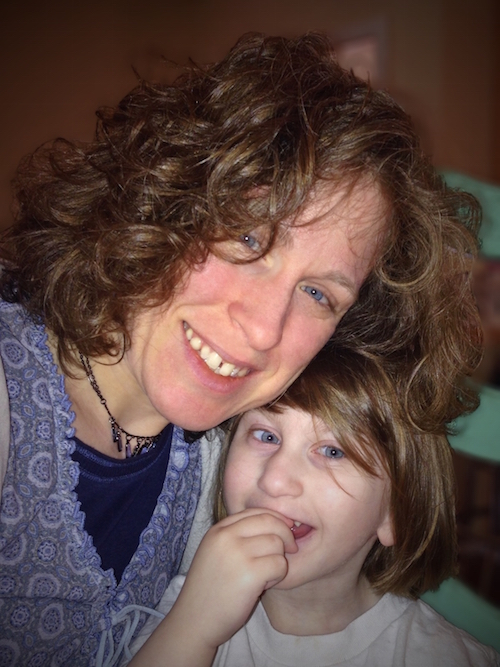PTSD and Special Needs Parents: 5 Ways to Prepare for Healing

Welcome once again to Different Dream’s ongoing series about PTSD in parents of kids with special needs. (You’ll find links to the rest of the series at the bottom of the page.) Today’s guest post comes from Brandy Brow, mother of 7 children, one of whom has special needs. Her post provides hope for parents who wonder if they can ever heal from the trauma they experienced as special needs parents and suggests ways to prepare for it when it comes.
PTSD and Special Needs Parents: 5 Ways to Prepare for Healing
Before my daughter was born with complex medical problems, I loved being around people and willingly shared my personal experiences. After months of hospital admissions and doctors’ wrongful blame for her condition, I avoided people and shared nothing.
Four years later she was mostly outpatient with a new team in a different hospital and we could finally settle home, but I wasn’t the same. Whenever something required emotional engagement, I’d instinctively turn away inside and shut off. I’d become reticent and wanted to stay that way.
Perhaps this is you or someone you know. If so, please read on, because there is hope.
Why Should I Care Again?
Deep down, you don’t really want to feel nothing. You don’t even want to feel no more pain. What you really want to feel is happy and free again.
Yeah, right, you may be thinking. That’s long gone and not coming back.
I know how you feel. After I tried unsuccessfully to find solutions, I decided there wasn’t one, so the next best thing was to tamp down my emotions to keep pain at bay.
Sound familiar? But be honest—it doesn’t keep down everything.
Pain would periodically flash up through my careful defenses and sear me, and the more I clamped down, the more ruin it brought: I couldn’t work, communicate with people, or feel anymore, and it destroyed opportunities.
I couldn’t fix me and consequently lost hope, but that didn’t matter. Healing found me anyway.
This is why you should care again: Your healing is possible regardless of how you feel.
Relief In Brokenness
I always thought as a Christian that I was responsible to fix everything wrong in myself, but after life went so bad, I simply couldn’t. I was unable to do menial tasks, much less identify problems. That left me feeling like a bad person and a terrible Christian who was doomed to spend the rest of her life stupid and numb.
The truth is, sometimes we’re too broken to fix ourselves and we need someone else to put us back together. (And if any Christian thinks differently, consider, Jesus wouldn’t have died if people could atone for their own sins.)
That’s a vulnerable place to be, and the last thing we want to feel when we’re reticent, but it’s also freeing. It means we don’t have to fix something we’re incapable of fixing.
There Is Hope
Fortunately, we don’t have to search for healing. It comes on its own through unsuspecting people without needing our trust to do its work.
When I was most secluded, several people reached out to me in various ways that addressed inner problems I’d shared with no one. Their cumulative outreach breached my defenses and became liquid love dropping on the tundra of my heart. It brought out capsules of pain I’d been unable to see or handle, and they were shielded with that liquid love, which gave me the strength and support I needed to face, feel, and heal from the pain.
Neither they nor I could not have done that purposely. It was healing doing its work, sent from God above who alone knew my innermost thoughts and needs.
We may not be able to heal ourselves, but we can prepare ourselves to receive healing.
5 Ways Traumatized Special Needs Parents Can Prepare for Healing
- Acknowledge Your Brokenness: Sometimes we don’t know we’re broken, can’t accept we’re broken, or we know we are but don’t want to admit it. You needn’t sound a trumpet about it, but be honest with yourself. If you aren’t working the way you normally would because of a trauma you sustained, admit it.
- Release Yourself: PTSD is not your fault, and neither is that you haven’t fixed it. Let yourself be broken without condemning yourself for it. Struggles and needs is a sign of humanity, not sin.
- Just Be: Quit striving. Be as you are, warts and all. You won’t stay this way forever because you’re alive and living beings change. Don’t despair if you can’t see it. Sometimes we’re like trees; our growth becomes apparent only after a lot of time passes.
- Small Chunks: You may be able to take in only small pieces of information or do limited activities before you overload and shut off. That’s OK. Do daily what you are able within your means.
- Rest in the Process: Healing takes time. Rushing it can stymy the process. You will find more peace if you accept and anticipate this, and let healing use all the time it needs to complete its perfect work.
I don’t know when your healing will come or how long it will take to complete, but prepare yourself and you’ll be ready for it. In fact, doing so may very well serve as its invitation.
Special Needs Parents, Do You Believe Healing Is Possible?
Do you truly believe healing is possible? What other questions do you have about self-healing and professional therapies for special needs parents? Leave them in the comment box.
Part 2: Special Needs Parents and PTSD–What About You Mom?
Part 5: PTSD in Parents–Moving from Negative to Positive
Part 6: PTSD and Special Needs Parents: 5 Ways to Prepare for Healing
Part 7: PTSD in Parents of Kids with Special Needs: Visualization as a Coping Tool
Part 8: Newborns Feel Pain: The Headline that Almost Triggered My PTSD
Part 10: Why Kids with PTSD Need Mentally Healthy Parents
Part 11: PTSD and Special Needs Parents: Calling it Like It Is
Do you like what you see at DifferentDream.com? You can receive more great content by subscribing to the quarterly Different Dream newsletter and signing up for the daily RSS feed delivered to your email inbox. You can sign up for the first in the pop up box and the second at the bottom of this page.

By Brandy Brow
Brandy S. Brow’s seventh child was born with a chromosome disorder so rare it has no name: she’s one of four cases ever diagnosed and possibly the last living. Thanks to her, Brandy is the only family member who can drive from Vermont to Boston, Massachusetts, without GPS.
www.pinterest.com/brandybrow
1 Comment
Trackbacks/Pingbacks
- Special Needs Parenting, Trauma, & PTSD | Special Connections - […] http://differentdream.com/2015/05/ptsd-and-special-needs-parents-5-ways-to-prepare-for-healing/ […]
- Medical-Related PTSD Part Two: Special Needs Caregiver Trauma - […] Part 6: PTSD and Special Needs Parents: 5 Ways to Prepare for Healing […]
Submit a Comment
Subscribe for Updates from Jolene
Related Posts
Inside Out Special Needs Parenting, Part 2: Brain Basics
This post in the Inside Out Special Needs Parenting series takes a look at brain basics to explain why kids can push our buttons.
Special Needs Parenting Stress and Medication
Sometimes will power alone can’t cure special needs parenting stress. Guest blogger Sheri Dacon explains when she realized medication had to be part of her healing.
Myths about PTSD in Children, Part 1
5 myths about PTSD in children is explained in the third episode of Jolene Philo’s video series for Rising Above Ministries and Jolene Philo.






Brandi doesn’t know how often I have thought of her since I first heard about the baby and added my name to the prayer list.
She has rightly identified a problem when grief does not have a name. This is her turn, not mine, but while mine was significantly different, it did not lack the pain and inability to discuss my heart feelings with anyone but God. Thankfully, ours is the God Who can help us overcome the circumstances into which we are drawn and over which we had no control.
It was half a lifetime ago.I was forty then, I am 87 now. I have lived and gone beyond those days, and experienced the full sufficiency of God.